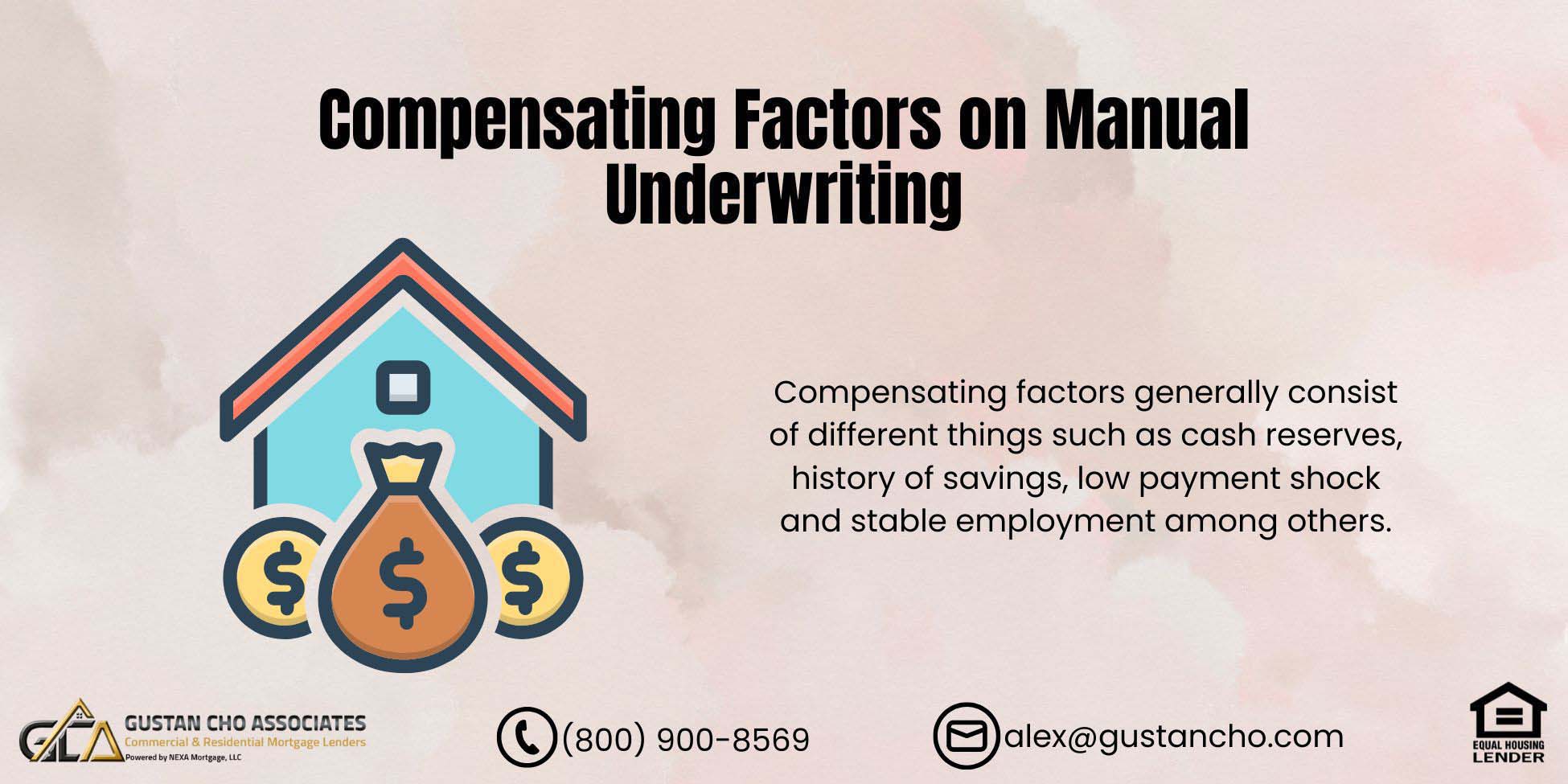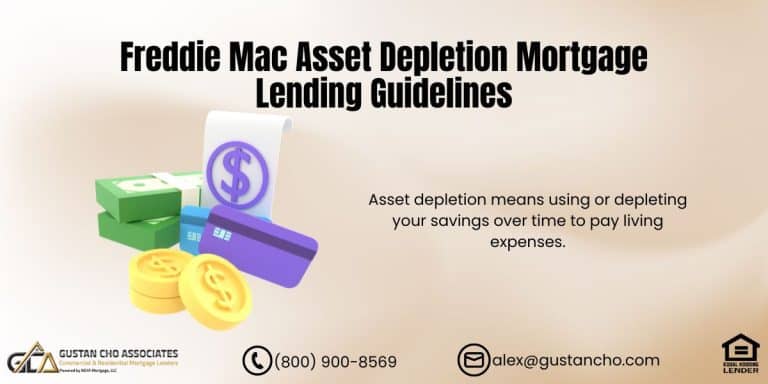In this blog, we will cover and discuss compensating factors on manual underwriting of FHA and VA loans. Compensating factors on manual underwriting on FHA and VA loans are what determine the debt-to-income ratio. Manual underwriting is considered riskier loans. FHA and VA loans are the only two mortgage loan program that allow manual underwriting.
VA loans do not have a maximum debt-to-income ratio caps on approve/eligible per automated underwriting system findings. FHA and VA loans are the only two loan programs that allow manual underwriting.
HUD and VA have similar manual underwriting guidelines. Manual underwriting have caps on front-end and back-end debt-to-income ratios. The maximum debt-to-income ratio on manual underwriting depends on the number of compensating factors. In the following paragraphs, we will cover compensating factors on manual underwriting of FHA and VA loans.
What Are Compensating Factors on Manual Underwriting on FHA and VA Loans?
FHA and VA loans are the two mortgage loan programs that allow manual underwriting. The manual underwritng guidelines on FHA and VA loans are almost identical. In this article, we will cover the following topics:
- What are compensating factors?
- Manual underwriting guidelines on compensating factors required for high debt to income ratio borrowers
- How many compensating factors are required for higher debt-to-income ratio on FHA and VA loans?
- The ability to repay.
The lender’s number one concern is the borrower’s ability to repay their mortgage. This is why compensating factor is important when it comes to higher debt to income ratio borrowers on manual underwriting. Compensating factors are favorable circumstances that help mortgage loan borrowers who have marginal credit and those who cannot get an approve/eligible per the automated underwriting system.
Talk To a Loan Officer Click Here
Refer/Eligible Per Automated Underwriting System (AUS)
Borrowers who get a refer/eligible per Automated Underwriting System can be eligible for a manual underwrite on FHA and VA loans. However, borrowers who need a manual underwrite with higher debt-to-income ratios need compensating factors on FHA and VA loans. Compensating factors on manual underwriting of FHA and VA loans is required for higher debt-to-income ratio borrowers. FHA and VA loans allow for manual underwriting. Borrowers who barely met the bare minimum mortgage qualification requirements set by HUD and VA can benefit greatly if they have compensating factors. In this article, we will discuss and cover compensating factors on manual underwriting of FHA and VA loans.
Manual Versus Automated Underwriting System Approval
Borrowers who barely met the mortgage lender’s minimum mortgage requirements or have higher debt-to-income ratios should have Compensating factors on manual underwriting. For example, the minimum credit score to qualify for a 3.5% down payment FHA loan is 580 FICO. The maximum debt-to-income ratio is 46.9% front end and 56.9% back to get an automated approval on Automated Underwriting System.
Compensating Factors on Manual Underwriting Debt-to-Income Ratio Caps
On Manual Underwriting, most lenders will cap debt-to-income ratios at 43%. Debt-to-income ratios can go up to 50% DTI on manual underwriting on FHA and VA loans with 2 compensating factors. If borrowers refer/eligible per AUS barely meet credit and DTI requirements, compensating factors on manual underwriting will most likely be necessary. Refer/eligible AUS findings mean the file is not approved by AUS and needs to be downgraded to a manual underwrite.
Speak With Our Loan Officer for Getting Mortgage Loans
What Are Compensating Factors on Manual Underwriting?
Examples of compensating factors are the following:
- All manual underwriting requires one month of reserves.
- One month’s reserves are one month of the borrower’s monthly housing payment: P.I.T.I.
The following are examples of compensating factors on manual underwriting files: Three months reserves are considered compensating factors. Verification of rent with low payment shock of no more than 5% payment shock or $100 increase whichever is less. The borrower has part-time income and/or other income for at least one year but is not used as qualifying income. The working spouse is not on the mortgage loan but has qualified income and assets.
Large Down Payment As Compensating Factors on Manual Underwriting
A larger down payment on a home purchase is considered compensating factor. Having two full-time jobs but only using one full-time job for qualifying on the home mortgage. Many years in the same job or industry with a pattern of getting promoted. Receiving regular wage increases. Pattern and history of saving money over time are considered compensating factors. Multiple compensating factors will be viewed favorably by mortgage underwriters. There is a lot of room for underwriter discretion on manual underwrites.
Letters of Explanations To Mortgage Underwriters
Letters of Explanations to mortgage underwriters are required on all of the following:
- Derogatory Credit
- Bankruptcy and housing events
- Credit Inquiries
- Late Payments
- Collections and Charge Offs
- Judgments and Tax Liens
- Gaps in Employment
What Makes a Strong Letter of Explanation
A good letter of explanation detailing borrowers’ compensating factors attached to the mortgage application will make the mortgage application much stronger. It will give more confidence to the mortgage loan underwriter in issuing a mortgage loan approval. Loan officers will go over with borrowers what to state on letters of explanation.
Letter of explanations with supporting documents and/or paperwork shows strength and credibility. Make the letter of explanation short, concise, legible, easy to understand, and legible.
Remember a strong letter of explanation goes a long way on manual underwrites. Mortgage underwriters have a lot of discretion on manual underwrites. Verification of rent with low payment shock is a strong compensating factor for manual underwrites. Timely rental payments in the past 12 months are required. A verification of rent form provided by the lender needs to be completed, signed, and dated by the landlord.
Examples of Compensating Factors on Manual Underwriting
Most lenders will require verification of rent on all manual underwriting files. However, Gustan Cho Associates will exempt verification of rent if the borrower has been living rent-free with family in order to save money for the down payment and/or closing costs of the home purchase. In order for verification of rent to be valid, the renter needs to provide either 12 months of canceled checks and/or 12 months of bank statements.
Verification of Rent with Low Payment Shock Considered Strong Compensating Factor
24 months of verification of rent will be a stronger compensating factor with a low payment shock. A rental payment that is close to the new mortgage payment will be considered a compensating factor. This is called having a low payment shock. This is because there will be little to no payment shock. The borrower makes a larger down payment than the bare minimum required is considered a compensating factor. This is a strong compensating factor because it proves to the mortgage underwriter that the borrower has more skin in the game. The mortgage lender has less risk due to the stronger down payment.
Layered Risk of Mortgage Lender
More equity investment from the borrower means less risk for the lender and a stronger borrower. The borrower has strong assets and reserves. The borrower rebuilt and reestablished credit with several creditors with no late payments after a bankruptcy and/or foreclosure or period of prior bad credit.
Paying Down Credit Cards During The Mortgage Process
Maxed-out credit cards or too much credit with high balances are not viewed favorably and can lower your credit scores. Maxed-out credit cards and multiple recent credit inquiries will scare away lenders. This is because it shows financial irresponsibility as well as the borrower living beyond his or her means. The longer the borrower’s credit history from his or her credit report shows the overall character of the payment patterns of the borrower. Aged on-time payment credit tradelines are viewed favorably by lenders.
Ability To Repay Mortgage
The borrower has part-time income or overtime income that has not yet been seasoned for two years, so it cannot be used for income qualification but shows that the borrower has extra income. These are considered compensating factors for the borrower. The mortgage loan underwriter will take this into consideration. There is only a minimal increase in the borrower’s housing expense so there is no payment shock. The borrower will not go from paying zero rent to a mortgage payment of $2,000.
History of Savings Are Compensating Factors on Manual Underwriting
The borrower has cash reserves for at least three months of housing payments and has other assets. This is a huge compensating factor that is viewed extremely favorably by mortgage underwriters. The borrower has non-taxable income whether from social security or pension income that has not been grossed up by 15% during income qualification. The borrower has advanced training in his field such as advanced degrees and/or specialized training that indicates the likelihood of the borrower being marketable in his or her field.
History of Consistent Job Advancement Through the Ranks Considered Compensating Factor
Shows a promotion or income advancement likely in the very near future. For example, a police officer with a law degree versus a police officer with a high school diploma. The law degree will be considered a compensating factor. This is due to the likelihood that he or she will have a greater chance of employment or advancement. This is due to their advanced education even if they were terminated or injured on the job.
Not All Lenders Will Do Manual Underwriting Mortgage Loans
Gustan Cho Associates is a national mortgage company licensed in multiple states with no overlays on government and conventional loans. A substantial percentage of our business is manual underwriting. The team at Gustan Cho Associates has a five-star national reputation for not having any lender overlays on government and conventional loans.
Overlays are mortgage guidelines that are above and beyond those of the federal minimum requirements imposed by FHA, VA, USDA, Fannie Mae, and Freddie Mac.
What this means is that as long as borrowers get an approve/eligible per DU Findings via Fannie Mae Automated Underwriting System, they are pretty much guaranteed a mortgage loan approval as long as borrowers can satisfy AUS conditions. Compensating factors on AUS approvals are not required. Compensating factors security blankets for lenders and offset risk. Many Banks and lenders may require compensating factors on approve/eligible borrowers as part of their overlays.
Are Compensating Factors Required on AUS Approved Findings Borrowers?
Homebuyers who cannot get an approve/eligible per Automated Underwriting System on VA or FHA loans and need to qualify for a mortgage with a five-star national mortgage company licensed in multiple states with no overlays can contact us at Gustan Cho Associates at 800-900-8569. Text us for a faster response. Or email us at alex@gustancho.com. Gustan Cho Associates is one of the largest lenders of originating FHA and VA Loans during and after Chapter 13 Bankruptcy with manual underwriting. We proud ourselves in being available to our borrowers 7 days a week including late evenings. All calls or email correspondences are returned no later than 15 minutes at the very latest.
Get expert mortgage advice now.
Compensating Factors Considered By Lenders on Manual Underwriting
Compensating factors are positive factors that add strength to borrowers. Larger down payments, cash reserves, rental verification, low debt to income ratios, and job longevity are examples of compensating factors. Comp factors are extremely important for borrowers who need FHA or VA manual underwriting who have the following:
- lower credit scores
- recent late payment
- high debt to income ratios
- 100% gifted funds and no funds of their own for the down payment
- prior bankruptcy
- foreclosure
- deed in lieu of foreclosure
- short sale
- those mortgage applicants who cannot get an approve/eligible per DU FINDINGS and need a manual underwrite
Who Needs Compensating Factors?
Compensating Factors are very important for all FHA and VA manual underwriting borrowers. Mortgage underwriters will look for comp factors by the following types of borrowers:
- 580 credit score
- very little to no credit tradelines
- late payments after housing event or bankruptcy
- no verification of rent
- multiple job changes in the past 2 years
- unpaid collection accounts
- no reserves or down payment
- down payment to be gifted
- multiple late payment history
Borrowers with the above types of credit history are borrowers who will most likely need compensating factors.
Compensating Factors Required For Bad Credit and Low Credit Scores
The layers of risk a mortgage lender is faced with the need to be offset by one or many comp factors for borrowers with weak credit and financial profiles. Compensating factors are viewed as positive strength for borrowers, which offsets the risk factors lender faces. It also helps demonstrate borrowers’ willingness and ability to pay the mortgage loan. All mortgage loans have a degree of risk factors. Using the many risk factors the weak credit profile borrowers faces and adding the compensating factors the applicant has can greatly increase the chances of a mortgage loan approval.
Examples of Positive Compensation Factors For High-Risk Borrowers
High residual income is one of the best compensating factors for mortgage underwriters. A residual household residual income of $1,200 for a single-person household. For a two-plus-person household, a $2,500 residual income is considered a favorable compensating factor. Low debt-to-income ratios is considered a comp factor.
What is a lower debt-to-income ratio to be considered a positive comp factor? A debt-to-income ratio that is lower than 5% or more than the mortgage loan program’s maximum requirement is considered a positive compensating factor.
A higher credit score and positive credit history with longevity are considered positive compensating factors in the views of a mortgage lender. Higher credit scores that are 720 or higher are comp factors. Various types of credit tradelines with longevity is considered positive and good compensating factors.
Reserve Requirements on Manual Underwriting
Reserves, cash in the bank, is a strong compensating factor. 3 to 6 months of reserves which include principal, interest, taxes, and homeowners insurance are considered reserves. A history of the saving pattern is a very strong compensating factor:
- Investment accounts.
- CDs.
- mutual fund investment accounts.
Borrowers with the above accounts prove financial responsibility and the eagerness of borrowers to save.
Verification of Rent With Low Payment Shock
Rental verification is a strong compensating factor. Rental verification is only valid if the mortgage loan applicant can provide 12 months of canceled checks or bank statements paid to the landlord. For those renters who are renting from a registered property management company, a VOR FORM provided by the lender and completed and signed by the property manager is a valid rental verification and can be used in lieu of canceled checks. Click here to verify of rent with low payment shock
Payment Shock Lower than 5% Considered Strong Compensating Factor on Manual Underwriting
Low payment shock is a strong compensating factor. For example, if the renter is currently paying $1,000 in rent and the proposed new housing payment that includes principal, interest, taxes, and insurance is $1,050. This is a strong good comp factor due to low payment shock. Up to 5% or less payment shock is a strong comp factor.
Down Payment on Home Purchase
A larger down payment than the minimum required is considered a strong compensating factor. For example, if the minimum down payment required is 3.5% on a home purchase. The home buyer wants to put in a 10% down payment. This is considered a strong comp factor. Less risk on the mortgage lender because the home buyer has more skin in the game.
Compensating Factors Considered By Lenders
VA loan programs do not require a down payment on VA loans. 100% of closing costs can be gifted by a family member or relative of home buyers. If borrowers have their own funds for closing costs instead of getting 100% funds gifted is acceptable. Homebuyers can get seller concessions or lender credit to cover closing costs. It is considered a stronger borrower if the borrower has his own closing costs, seller concession, or lender credit versus gift funds. It adds more weight to the financial and credit strength of the borrower. If the borrowers do not get gift funds.
Is Longevity In Employment Considered Compensating Factors?
Employment history and a history of income increases are strong comp factors. Also, verified income but income that cannot be used is considered strong compensating factors. For example, to be able to use overtime or part-time income, borrowers need a 24-month history. If borrowers only have 18 months of overtime or part-time income, it cannot be used as income since it is short of the 24-month requirement. However, overtime and part-time income can be verified. This verified income is a comp factor even though it cannot be used for income qualification purposes.
Compensating Factors To Offset Layered Risk Factors
There are several factors that mortgage lenders view as risk factors. Mortgage lenders view limited reserves as high-risk factors. Smaller down payments or minimum down payments are considered risk factors versus larger down payments by home buyers. No rental verification and weak credit payment history are also considered risk factors by lenders. Limited credit and credit history are considered risk factors. High debt-to-income ratios are definitely risk factors and so are gifted funds for the down payment.
Compensating Factors Considered By Lenders
To summarize, compensating factors only come into play on manual underwriting files on borrowers with higher debt-to-income ratios. For more information on this blog or other mortgage-related topics, please contact us at Gustan Cho Associates at 800-900-8569 or text us for a faster response. Or email us at gcho@gustancho.com.
Mortgage Lenders With No Overlays on Manual Underwriting
Gustan Cho Associates is a mortgage company licensed in multiple states with no lender overlays on government and conventional loans. We also have a national reputation of being a one-stop mortgage shop due to having dozens of non-QM and alternative lending programs on owner-occupant homes, second homes, and investment properties. The team at Gustan Cho Associates is available 7 days a week, on evenings, weekends, and holidays. This guide on Compensating Factors on Manual Underwriting Was UPDATED on January 6th, 2024. Click here for mortgage loan with no lenders overlay on manual underwriting
FAQs: Compensating Factors on Manual Underwriting
1. What are the compensatory factors for FHA and VA credit handbook underwriting? Compensating factors generally consist of different things such as cash reserves, history of savings, low payment shock and stable employment among others.
2. Why are compensating factors important in manual underwriting? This usually means that even if a borrower doesn’t meet automated underwriting system (AUS) criteria, he or she may be considered for loan approval based on manual underwriting due to the fact that they have other strengths that outweigh the perceived risks associated with such issues like lower credit scores or higher debts.
3. How many compensating factors are needed for FHA and VA loans? Depending on specific situations, the number keeps varying but having more positives like significant cash reserves, stable employment and low debt to income ratio usually strengthens an application for manual underwriting approval.
4. What are examples of compensating factors? For instance, having cash reserves can be viewed as savings or investments, while payment shock can be seen as a minimal increase in housing expenses. Another example would be longevity in employment or industry whereas rental verification could demonstrate consistency in timely payments. Moreover, higher down payments than what is required and good credit score despite past blunders in bankruptcy or foreclosure could also constitute these type of factors.
5. Who needs compensating factors for FHA and VA manual underwriting? Generally, those with poor credit ratings, recent late payments, high debt ratios who cannot get an approved/eligible status through AUS findings need compensating factors.
6. How do compensating factors affect loan approval? Compensating Factors always strengthen a potential borrower’s application by showing signs of financial stability and responsible use of credit which in turn persuade lenders to approve the loan irrespective of accompanying risks.
If you need more details or answers regarding this subject matter, feel free to contact Gustan Associates at 800-900-8569 or email us at gcho@gustancho.com.











